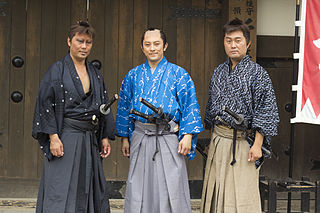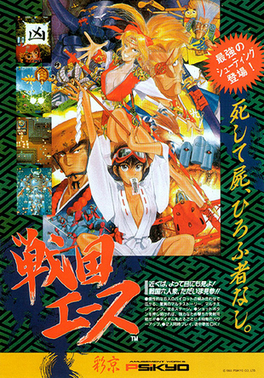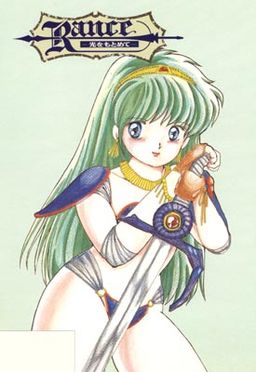
Data East Corporation, also abbreviated as DECO, was a Japanese video game, pinball and electronic engineering company. The company was in operation from 1976 to 2003, and released 150 video game titles. At one time, the company had annual sales of 20 billion yen in the United States alone but eventually went bankrupt. The American subsidiary, Data East USA, was headquartered in San Jose, California. Its main headquarters were located in Suginami, Tokyo.

BurgerTime, originally released as Hamburger in Japan, is a 1982 arcade video game from Data East released initially for its DECO Cassette System. The player is chef Peter Pepper, who must walk over hamburger ingredients in a maze of platforms and ladders while avoiding anthropomorphic hot dogs, fried eggs, and pickles which are in pursuit.
Hack and slash, also known as hack and slay or slash 'em up, refers to a type of gameplay that emphasizes combat with melee-based weapons. They may also feature projectile-based weapons as well as secondary weapons. It is a sub-genre of beat 'em up games, which focuses on melee combat, usually with swords. Third-person hack and slash games are also sometimes known as character action games and spectacle fighters.

Bad Dudes Vs. DragonNinja, also known simply as either Bad Dudes or DragonNinja, is a side-scrolling cooperative beat 'em up game developed and released by Data East for arcades in 1988. It was also ported to many computer and game console home systems.

Jidaigeki is a genre of film, television, video game, and theatre in Japan. Literally meaning "period dramas", it refers to stories that take place before the Meiji Restoration of 1868.
Sarutobi Sasuke is a ninja who appears in kōdan narrative art and fictional writings. The nickname is generally believed to have been concocted from Meiji to the Taishō period. Some argue he is based on real live personages, such as Kōzuki Sasuke and Sarutobi Nisuke. His family name, meaning "monkey jump", is written with two kanji; saru (猿) is the character for "monkey", and tobi (飛) is the character for "jump". He was known for his monkey-like agility and quickness, especially in trees. Many depictions portray him as having been orphaned and raised by a band of monkeys, therefore giving rise to the monkey-like abilities. He has been described as a superhero ninja, and caused a boom of ninjas in popular culture during the 1910s-1920s in Japan.

Sengoku is a beat 'em up arcade game. It is the first entry of the Sengoku trilogy by SNK. It was ported to numerous home consoles including the Neo Geo, Neo Geo CD, Mega-CD and Super Famicom. The arcade version was part of SNK Arcade Classics Vol. 1, released in 2008. The Neo Geo version was re-released on the Japanese Virtual Console in 2011, with the sequels for the North American Virtual Console on November 8, 2012 and June 6, 2013 and for the PAL region on February 7, 2013 and September 5, 2013. In 2009 the series was compiled on the Sengoku Anthology for PlayStation 2 and Windows.
The Sanada Ten Braves are a fictional group of ninja that assisted the warlord Sanada Yukimura during the Warring States era of Japan; that is, the late Sengoku period and its immediate aftermath, also known as the Azuchi–Momoyama and the early Edo periods.
Fūma Kotarō was the name adopted by the leader of the ninja Fūma clan during the Sengoku era of feudal Japan. He was a retainer of the Later Hōjō clan. According to some records, his name was originally Kazama Kotarō.

Sengoku Basara (戦国BASARA) is a series of video games developed and published by Capcom, and a bigger media franchise based on it, including three anime shows, an anime movie, a live action show, and numerous drama CDs, light novels, manga, and stage plays. Its story is loosely based on real events of the titular Sengoku period in the history of feudal Japan. Sengoku Basara was popular in Japan when the games released as they won multiple awards, became a cultural phenomenon, been cited as an example of games as art, and gained a passionate fanbase.

The DECO Cassette System is an arcade system that was introduced by Data East in October 1980. It was the first standardised arcade system that allowed arcade owners to change games. Developed in 1979, it was released in Japan in 1980 and then North America in 1981.

Sengoku Ace, fully titled Sengoku Ace: Tengai Episode I and also known as Samurai Aces in the English version, is a vertically scrolling shooter released in the arcades by Psikyo in 1993. The first game by Psikyo, Sengoku Ace was designed by Shinsuke Nakamura, the creator of Aero Fighters and the company's founder.

Atomic Runner Chelnov is a Japanese runner arcade video game developed and published by Data East in 1988.

Sengoku Blade, also known as Tengai outside Japan, is a horizontally scrolling shoot 'em up video game released for arcade machines in 1996 by Psikyo as a sequel to their 1993 shooter Sengoku Ace. A home console version was also released for the Sega Saturn. The game was ported years later to the PlayStation 2, and again for iOS and Android devices and the Nintendo Switch, Windows, PlayStation 4 and Xbox One. The game is set in a historical fantasy version of the Sengoku period of Japanese history, featuring demons, magic and steam-powered robotics.

Ninja Commando is a vertically scrolling run and gun video game developed by Alpha Denshi and published by SNK for the Neo Geo arcade and home systems in 1992. It was released for the Neo Geo CD in 1994.

Battle Girls: Time Paradox, known in Japan as Sengoku Otome: Momoiro Paradox, is a 2011 Japanese anime television series based on the CR Sengoku Otome pachinko game series developed by Heiwa. Produced by TMS Entertainment under the direction of Hideki Okamoto, the anime series aired on TV Tokyo between April 4, 2011, and June 27, 2011. The series has been licensed in North America by Sentai Filmworks. A video game based on the series, Sengoku Otome: Legend Battle, was released for PlayStation Vita on August 25, 2016.

Rance is a role-playing video-game series created, developed, and published by AliceSoft. It is the longest-running erotic video game series in history, with nearly 30 years between the first game and the conclusion of the series. The first installment, Rance: The Quest for Hikari, was released in 1989, while the last main-series game, Rance X: Showdown, was released in 2018.












